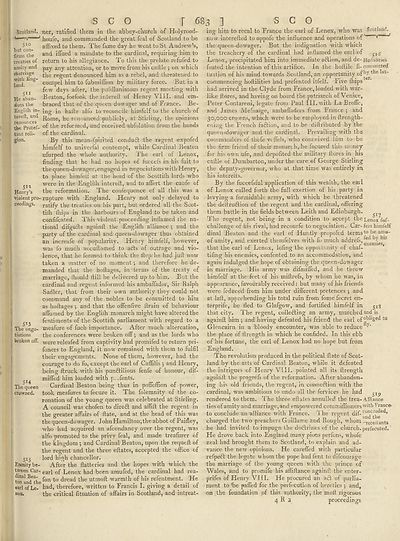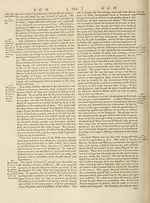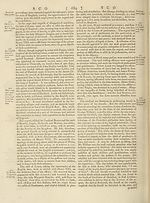Encyclopaedia Britannica, or, a Dictionary of arts, sciences, and miscellaneous literature : enlarged and improved. Illustrated with nearly six hundred engravings > Volume 18, RHI-SCR
(721) Page 683
Download files
Complete book:
Individual page:
Thumbnail gallery: Grid view | List view

Scotland.
51°
but con¬
firms the
treaties of
amity and
marriage
with .Eng¬
land.
5“
He aban¬
dons the
Englifli in-
tereft, and
renounces
the Protei-
tant reli¬
gion.
512
Henry’s
violent pro¬
ceedings.
513
The nego¬
tiations
broken off.
5*4
The queen
crowned.
t- S.IS
Enmity be¬
tween Car¬
dinal Bea¬
ton and the
earl of Le¬
nox,
SCO [68
tier, ratified them in the abbey-church of Hulyrood-
houfe, and commanded the great feal of Scotland to be
affixed to them. The fame day he went to St Andrew’s,
and iffued a mandate to the cardinal, requiring him to
return to his allegiance. To this the prelate refufed to
pay any attention, or to move from his caitle ; on which
the regent denounced him as a rebel, and threatened to
compel him to fubmiflion by military force. But in a
few days after, the puhllanimous regent meeting with
Beaton, forfook the intereft of Henry VIII. and em¬
braced that of the queen dowager and of France. Be¬
ing in hafte alio to reconcile himfelf to the church of
Rome, he renounced publicly, at Stirling, the opinions
of the reformed, and received abfolution from the hands
of the cardinal.
By this mean-fpirited conduct the regent expofed
himfelf to univerfal contempt, while Cardinal Beaton
ufurped the whole authority. The earl of Lenox,
finding that he had no hopes of iuccefs in his fuit to
the queen-dowager,engaged in negociations with Henry,
to place himfeit at the head of the Scottiffi lords who
were in the Engliih intereft, and to aflert the caufe of
the reformation. The confequence of all this was a
rupture with England. Henry not only delayed to
ratify the treaties on his part, but ordered all the Scot-
tilh (hips in the harbours of England to be taken and
confifcated. This violent proceeding inflamed the na¬
tional difgufts againft the Engliih alliance ; and the
party of the cardinal and queen-dowager thus obtained
an increafe of popularity. Henry himfelf, however,
was fo much accuftomed to ads of outrage and vio¬
lence, that he feemed to think the ftep he had juft now
taken a matter of no moment; and therefore he de¬
manded that the hoftages, in terms of the treaty of
marriage, fhould ftill be delivered up to him. But the
cardinal and regent informed his ambafiador, Sir Ralph
Sadler, that from their own authority they could not
command any of the nobles to be committed to him
as hoftages ; and that the offenfive ftrain of behaviour
affumed by the Engliih monarch might have altered the
fentiments of the Scottifh parliament with regard to a
meafure of fuch importance. After much altercation,
the conferences were broken off; and as the lords who
were releafed from captivity had promifed to return pri-
foners to England, it now remained with them to fulfil
their engagements. None of them, however, had the
courage to do fo, except the earl of Caffilis ; and Henry,
being ftruck with his punftilious fenfe of honour, dif-
miffed him loaded with p. Tents.
Cardinal Beaton being thus in poffeffion of power,
took meafures to fecure it. The folemnity of the co¬
ronation of the young queen was celebrated at Stirling.
A council was chofen to dire£I and affift the regent in
the greater affairs of ftate, and at the head of this was
thequeen-dowager. John Hamilton, the abbot of Paifley,
who had acquired an afcendancy over the regent, was
alfo promoted to the privy feal, and made treafurer of
the kingdom *, and Cardinal Beaton, upon the requeft of
the regent and the three eftates, accepted the office of
lord high chancellor.
After the flatteries and the hopes with which the
earl of Lenox had been amufed, the cardinal had rea-
fon to dread the utmoft warmth of his refentment. He
had, therefore, written to Francis I. giving a detail of
the critical fituation of affairs in Scotland, and intreat-
3 ] SCO
ing him to recal to France the earl of Lenox, who was Scotlamf.,
now interefted to oppofe the influence and operations of ' v
the queen-dowager. But the indignation with which
the treachery of the cardinal had inflamed the earl of
Lenox, precipitated him into immediate adlion, and de-Hoftilities
feated the intention of this artifice. In the hoftile fi- committed
tuation of his mind towards Scotland, an opportunity of ^ t'lc 'at‘
commencing hoftilities had prefented itfelt. Five fhips
had arrived in the Clyde from France, loaded with war¬
like ftores, and having on hoard the patriarch of Venice,
Peter Contareni, legate from Paul III. with La Broffe,
and James Mefnaige, ambaffadors from France ; and
30,000 crowns, which were to be employed in ftrength-
ening the French fadlion, and to be diftributed by the
queen-dowager and the cardinal. Prevailing with the
commanders of thefe vcflels, who conceived him to be
the firm friend of their monarch, he fecured this money
for his own ufe, and depofited the military ftores in his
caftle of Dumbarton, under the care of George Stirling
the deputy-governor, who at that time was entirely in
his interefts.
By the fuccefsful application of this wealth, the earl
of Lenox called forth the full exertion of his party in
levying a formidable army, with which he threatened
the deftru£Hon of the regent and the cardinal, offering
them battle in the fields between Leith and Edinburgh. ^
The regent, not being in a condition to accept theLenoxVuf-
challenge of his rival, had recourfe to negociation. Car-fers himfelf
dinal Beaton and the earl of Huntly propofed terms *° amu-
of amity, and exerted themfelves with fo much addreis, ^s‘L'
that the earl of Lenox, lofing the opportunity of chal-
tifmg his enemies, confented to an accommodation, and
again indulged the hope of obtaining the queen-dowager
in marriage. His army was difmifled, and he threw
himfelf at the feet of his miftrefs, by whom he was, in
appearance, favourably received: but many of his friends
were feduced from him under different pretences ; and
at laft, apprehending his total ruin from fome fecret en-
terprife, he fled to Glafgow, and fortified himfelf in
that city. The regent, colledling an army, marched and is
againft him ; and having defeated his friend the earl of°b^Se^ t0
Glencairn in a bloody encounter, was able to reduce '*
the place of ftrength in which he confided. In this ebb
of his fortune, the earl of Lenox had no hope but from
England.
The revolution produced in the political ftate of Scot¬
land by the arts of Cardinal Beaton, while it defeated
the intrigues of Henry VIII. pointed all its ftrength
againft the progrefs of the reformation. After abandon¬
ing his old friends, the regent, in connexion with the
cardinal, was ambitious to undo all the fervices he had ^rp
rendered to them. The three eftates annulled the trea-Alliance
ties of amity and marriage, and empowered commiffioners whh ’■'ranee*
to conclude an alliance with France. The regent dif-
charged the two preachers Guillame and Rough, whom ..roteUants
he had invited to impugn the dodlrines of the church, perfecuted.
He drove back into England many pious perfons, whofe
zeal had brought them to Scotland, to explain and ad¬
vance the new opinions. He careffed with particular
refpedf the legate whom the pope had fent to difcouiage
the marriage of the young queen with the prince of
Wales, and to promife his affiftance againft the enter-
prifes of Henry VIII. He procured an act of parlia¬
ment to !be paffed for the perfecution of heretics ; and,
on the foundation of this authority, the moll rigorous
4 R 2 proceedings
51°
but con¬
firms the
treaties of
amity and
marriage
with .Eng¬
land.
5“
He aban¬
dons the
Englifli in-
tereft, and
renounces
the Protei-
tant reli¬
gion.
512
Henry’s
violent pro¬
ceedings.
513
The nego¬
tiations
broken off.
5*4
The queen
crowned.
t- S.IS
Enmity be¬
tween Car¬
dinal Bea¬
ton and the
earl of Le¬
nox,
SCO [68
tier, ratified them in the abbey-church of Hulyrood-
houfe, and commanded the great feal of Scotland to be
affixed to them. The fame day he went to St Andrew’s,
and iffued a mandate to the cardinal, requiring him to
return to his allegiance. To this the prelate refufed to
pay any attention, or to move from his caitle ; on which
the regent denounced him as a rebel, and threatened to
compel him to fubmiflion by military force. But in a
few days after, the puhllanimous regent meeting with
Beaton, forfook the intereft of Henry VIII. and em¬
braced that of the queen dowager and of France. Be¬
ing in hafte alio to reconcile himfelf to the church of
Rome, he renounced publicly, at Stirling, the opinions
of the reformed, and received abfolution from the hands
of the cardinal.
By this mean-fpirited conduct the regent expofed
himfelf to univerfal contempt, while Cardinal Beaton
ufurped the whole authority. The earl of Lenox,
finding that he had no hopes of iuccefs in his fuit to
the queen-dowager,engaged in negociations with Henry,
to place himfeit at the head of the Scottiffi lords who
were in the Engliih intereft, and to aflert the caufe of
the reformation. The confequence of all this was a
rupture with England. Henry not only delayed to
ratify the treaties on his part, but ordered all the Scot-
tilh (hips in the harbours of England to be taken and
confifcated. This violent proceeding inflamed the na¬
tional difgufts againft the Engliih alliance ; and the
party of the cardinal and queen-dowager thus obtained
an increafe of popularity. Henry himfelf, however,
was fo much accuftomed to ads of outrage and vio¬
lence, that he feemed to think the ftep he had juft now
taken a matter of no moment; and therefore he de¬
manded that the hoftages, in terms of the treaty of
marriage, fhould ftill be delivered up to him. But the
cardinal and regent informed his ambafiador, Sir Ralph
Sadler, that from their own authority they could not
command any of the nobles to be committed to him
as hoftages ; and that the offenfive ftrain of behaviour
affumed by the Engliih monarch might have altered the
fentiments of the Scottifh parliament with regard to a
meafure of fuch importance. After much altercation,
the conferences were broken off; and as the lords who
were releafed from captivity had promifed to return pri-
foners to England, it now remained with them to fulfil
their engagements. None of them, however, had the
courage to do fo, except the earl of Caffilis ; and Henry,
being ftruck with his punftilious fenfe of honour, dif-
miffed him loaded with p. Tents.
Cardinal Beaton being thus in poffeffion of power,
took meafures to fecure it. The folemnity of the co¬
ronation of the young queen was celebrated at Stirling.
A council was chofen to dire£I and affift the regent in
the greater affairs of ftate, and at the head of this was
thequeen-dowager. John Hamilton, the abbot of Paifley,
who had acquired an afcendancy over the regent, was
alfo promoted to the privy feal, and made treafurer of
the kingdom *, and Cardinal Beaton, upon the requeft of
the regent and the three eftates, accepted the office of
lord high chancellor.
After the flatteries and the hopes with which the
earl of Lenox had been amufed, the cardinal had rea-
fon to dread the utmoft warmth of his refentment. He
had, therefore, written to Francis I. giving a detail of
the critical fituation of affairs in Scotland, and intreat-
3 ] SCO
ing him to recal to France the earl of Lenox, who was Scotlamf.,
now interefted to oppofe the influence and operations of ' v
the queen-dowager. But the indignation with which
the treachery of the cardinal had inflamed the earl of
Lenox, precipitated him into immediate adlion, and de-Hoftilities
feated the intention of this artifice. In the hoftile fi- committed
tuation of his mind towards Scotland, an opportunity of ^ t'lc 'at‘
commencing hoftilities had prefented itfelt. Five fhips
had arrived in the Clyde from France, loaded with war¬
like ftores, and having on hoard the patriarch of Venice,
Peter Contareni, legate from Paul III. with La Broffe,
and James Mefnaige, ambaffadors from France ; and
30,000 crowns, which were to be employed in ftrength-
ening the French fadlion, and to be diftributed by the
queen-dowager and the cardinal. Prevailing with the
commanders of thefe vcflels, who conceived him to be
the firm friend of their monarch, he fecured this money
for his own ufe, and depofited the military ftores in his
caftle of Dumbarton, under the care of George Stirling
the deputy-governor, who at that time was entirely in
his interefts.
By the fuccefsful application of this wealth, the earl
of Lenox called forth the full exertion of his party in
levying a formidable army, with which he threatened
the deftru£Hon of the regent and the cardinal, offering
them battle in the fields between Leith and Edinburgh. ^
The regent, not being in a condition to accept theLenoxVuf-
challenge of his rival, had recourfe to negociation. Car-fers himfelf
dinal Beaton and the earl of Huntly propofed terms *° amu-
of amity, and exerted themfelves with fo much addreis, ^s‘L'
that the earl of Lenox, lofing the opportunity of chal-
tifmg his enemies, confented to an accommodation, and
again indulged the hope of obtaining the queen-dowager
in marriage. His army was difmifled, and he threw
himfelf at the feet of his miftrefs, by whom he was, in
appearance, favourably received: but many of his friends
were feduced from him under different pretences ; and
at laft, apprehending his total ruin from fome fecret en-
terprife, he fled to Glafgow, and fortified himfelf in
that city. The regent, colledling an army, marched and is
againft him ; and having defeated his friend the earl of°b^Se^ t0
Glencairn in a bloody encounter, was able to reduce '*
the place of ftrength in which he confided. In this ebb
of his fortune, the earl of Lenox had no hope but from
England.
The revolution produced in the political ftate of Scot¬
land by the arts of Cardinal Beaton, while it defeated
the intrigues of Henry VIII. pointed all its ftrength
againft the progrefs of the reformation. After abandon¬
ing his old friends, the regent, in connexion with the
cardinal, was ambitious to undo all the fervices he had ^rp
rendered to them. The three eftates annulled the trea-Alliance
ties of amity and marriage, and empowered commiffioners whh ’■'ranee*
to conclude an alliance with France. The regent dif-
charged the two preachers Guillame and Rough, whom ..roteUants
he had invited to impugn the dodlrines of the church, perfecuted.
He drove back into England many pious perfons, whofe
zeal had brought them to Scotland, to explain and ad¬
vance the new opinions. He careffed with particular
refpedf the legate whom the pope had fent to difcouiage
the marriage of the young queen with the prince of
Wales, and to promife his affiftance againft the enter-
prifes of Henry VIII. He procured an act of parlia¬
ment to !be paffed for the perfecution of heretics ; and,
on the foundation of this authority, the moll rigorous
4 R 2 proceedings
Set display mode to:
![]() Universal Viewer |
Universal Viewer | ![]() Mirador |
Large image | Transcription
Mirador |
Large image | Transcription
Images and transcriptions on this page, including medium image downloads, may be used under the Creative Commons Attribution 4.0 International Licence unless otherwise stated. ![]()
| Permanent URL | https://digital.nls.uk/193028080 |
|---|
| Attribution and copyright: |
|
|---|
| Description | Ten editions of 'Encyclopaedia Britannica', issued from 1768-1903, in 231 volumes. Originally issued in 100 weekly parts (3 volumes) between 1768 and 1771 by publishers: Colin Macfarquhar and Andrew Bell (Edinburgh); editor: William Smellie: engraver: Andrew Bell. Expanded editions in the 19th century featured more volumes and contributions from leading experts in their fields. Managed and published in Edinburgh up to the 9th edition (25 volumes, from 1875-1889); the 10th edition (1902-1903) re-issued the 9th edition, with 11 supplementary volumes. |
|---|---|
| Additional NLS resources: |
|

